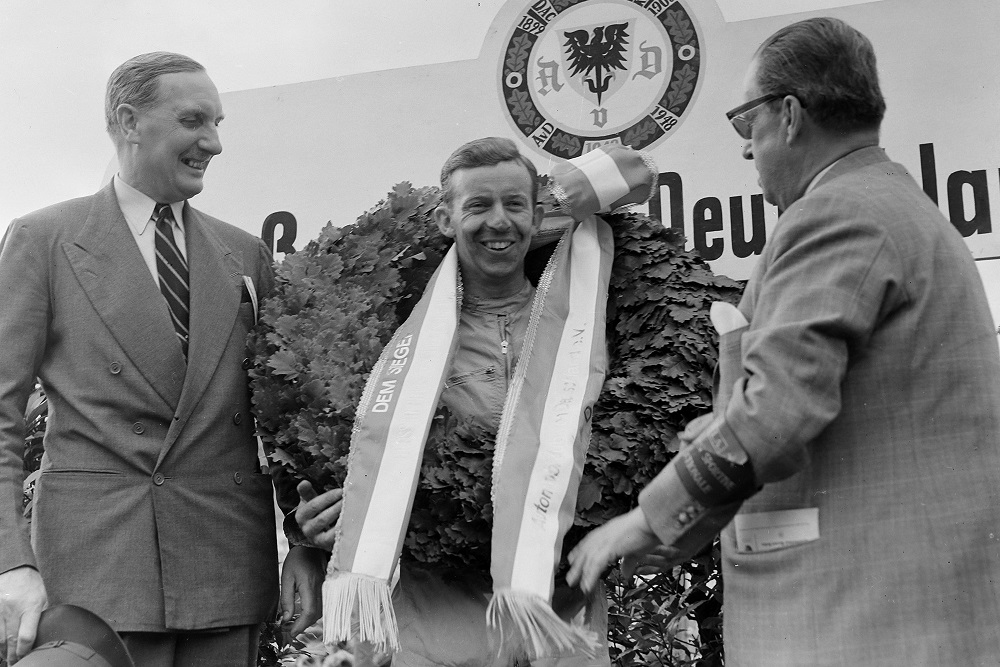NASIR RETURNS FROM THE MIAMI GRAND PRIX WITH ALL THE GOODIES YOU WANT, WE HAVE A BULGING MOTORSPORTS MONDIAL WITH A THROWBACK INTERVIEW FROM 2009 THE LATE TONY BROOKS!
Tony Brooks, one of the defining Formula 1 drivers of the 1950s, has died aged 90, his daughter Giulia announced on Tuesday.
The Briton won six grands prix and narrowly missed out on the world championship in 1959.
Brooks is regarded alongside Moss as the best British driver never to win the F1 title.
Moss, who died two years ago, also aged 90, said of his former team-mate and friend: “Brooks was a tremendous driver, the greatest – if he’ll forgive me saying this – ‘unknown’ racing driver there’s ever been. He was far better than several people who won the world championship.”

F1 CEO: Stefano Domenicali paid tribute to Brooks in a statement, saying: “I was saddened to hear the news that Tony Brooks has died. “He was part of a special group of drivers who were pioneers and pushed the boundaries at a time of great risk. “He will be missed and our thoughts are with his family at this time.”
Brooks, who had been the last surviving F1 race winner of the 1950s, left a considerable mark on the sport – between 1956 and 1959, he won 46% of the races he finished, in an era when mechanical reliability was a significant feature in motorsport.
Brooks famously won his first ever F1 race, the Syracuse Grand Prix of 1955, in which he competed as a last-minute entry for the Connaught team while studying for his dentistry finals at Manchester University.
Receiving a call from the team while revising, Brooks went to Italy, missed the first practice day, learned the circuit on a Vespa, and then caused a sensation by leading home the Maseratis of world championship regulars Luigi Musso and Luigi Villoresi, to achieve the first international grand prix win for a British car since 1924.

Brooks and Moss share the victory at the end of the 1957 British Grand Prix
His success put his career as a dentist on the backburner, as he decided to focus full-time on motor racing.
He entered F1 in 1956 with BRM, but he raced only twice in a car that was not a success – and Brooks was lucky to escape without serious injury from a crash when its throttle stuck open during the 1956 British Grand Prix.
The following year marked his breakthrough. Joining the Vanwall team alongside Moss, Brooks finished second in Monaco to Fangio, who was on course for the last of his five world titles, and then won the British Grand Prix, sharing with Moss.

Brooks was suffering from injuries sustained in a heavy crash at Le Mans the month before, but still qualified third. And after Moss retired from the race while leading, a fatigued Brooks handed over his car and Moss went on to a famous win.
Brooks – as befitted his talent – always shone brightest on the most demanding circuits, and in 1958 underlined his skills with impressive victories on the daunting Spa-Francorchamps and Nurburgring Nordschleife circuits in the Belgian and German Grands Prix.
Having moved to Ferrari in 1959, he should have won the world title. Wins in France and Germany, along with second in Monaco, meant he went into the final race at Sebring in Florida still in with a chance of the championship despite problems at the other races.
Play Podcast: 05-11-22f1weekly938.mp3
